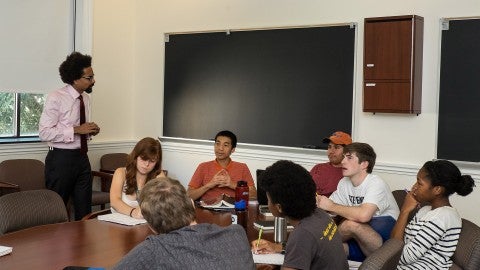The Department of History welcomes applications from highly accomplished undergraduates as well as master’s degree holders. Our faculty members direct dissertations in U.S. history, including U.S. and the World topics; Atlantic World history; Latin American history; and the history of the Middle East. These areas are supplemented by an interconnected range of supporting courses and fields, including, science and technology, early modern and modern colonial history, African history, Asian history, European history, world history, gender history, transnational history, economic history, and the history of empires.
For both coursework and dissertation committees, students will be able to draw on the expertise of multiple faculty in each major and minor field and can put together innovative combinations of specific geographic and temporal approaches.
- United States History, especially U.S. South and U.S. and the World
-
For students specializing in U.S. history, with the colonial era of North America included under that broad rubric, the department has exceptional strengths in the study of slavery, race, the Civil War, southern history (particularly for the eighteenth and nineteenth centuries); and in the study of the U.S. and the World across all time periods but with particular emphasis on the twentieth century. The U.S. and the World field combines the history of international relations with a history of economic, social, and cultural relations, stressing the complex and often power-infused connections between the United States and other parts of the world. The field presupposes intimate knowledge both of U.S. history and of the history of other areas, and therefore assumes linguistic competence in the languages of those regions. Several of the leading practitioners of the U.S. and the World field are in the department.
Primary Faculty: Byrd, Citino, Hall, McDaniel, Shimizu, Sidbury, Yarbrough
- Latin American History, especially Brazil and Mexico
-
Through reciprocal institutional agreements students of Latin American history have the extraordinary opportunity to earn a second Ph.D. at one of two highly rated universities in Latin America. Students competent in Portuguese may enter the dual degree program with the Universidade Estadual de Campinas (UNICAMP) in São Paulo. Students study in Brazil for a year and write a dissertation that is co-supervised by faculty at Rice and UNICAMP. Students who are competent in Spanish may apply for the dual degree program with the prestigious Instituto Mora in Mexico City. Students in this program study in Spanish, and their dissertations are co-supervised by Rice faculty and faculty from Instituto Mora.
Primary Faculty: López-Alonso, Metcalf, Suárez-Potts
- Atlantic World History
-
The department’s resources for scholars of the Atlantic World run deep and allow for groundbreaking topics across a long period of early modern and modern history. Specialists in early North America, colonial Brazil, modern Mexico, colonial Africa, early modern Great Britain, Native American history, and other fields contribute to revealing the complicated histories that are woven together throughout the Atlantic basin. Students of U.S. history also often situate their work on the early United States and its colonial past within the broader Atlantic World. Students consult with individual faculty to define their specialized examination fields within U.S. and Atlantic World history.
Primary Faculty: Byrd, Domingues, McDaniel, Metcalf, Pollnitz, Shimizu, Sidbury, Ward
- Middle Eastern History
-
The department has considerable strengths in key areas of modern Arab history, and it hosts an endowed chair in Arab Studies. It boasts strong coverage of histories of anticolonialism, revolutions, popular movements, state-formation, intellectual and political currents, and US-Arab relations. We especially welcome scholars working on Palestine, the broader Bilad al-Sham region, as well the Arabian Peninsula and the Gulf.
Complementary Expertise in the Department
Other members of the faculty also bring their expertise to the graduate program in areas such as the history of science and technology, the history of human rights, the history of states and migration, European and Asian history, transnational Asia, world history, comparative empires, and the history of social and political thought.
Faculty: Balabanlilar, Barlow, Caldwell, Campos, Cohen, Irish, Petrick, Pollnitz, Ward, Wildenthal
Resources Outside of the Department
In addition to defining particular examination fields from the broad areas of historical focus explained above, graduate students are encouraged to draw on interdisciplinary resources around the university. Doctoral students can take relevant courses in other departments in the humanities and social sciences. Students may also take some courses at the University of Houston. In addition, programs such as the Center for the Study of Women, Gender, and Sexuality, the Humanities Research Center, the Chao Center for Asian Studies, the Baker Institute for Public Policy, and the Kinder Institute for Urban Research offer opportunities for interdisciplinary graduate exploration.

